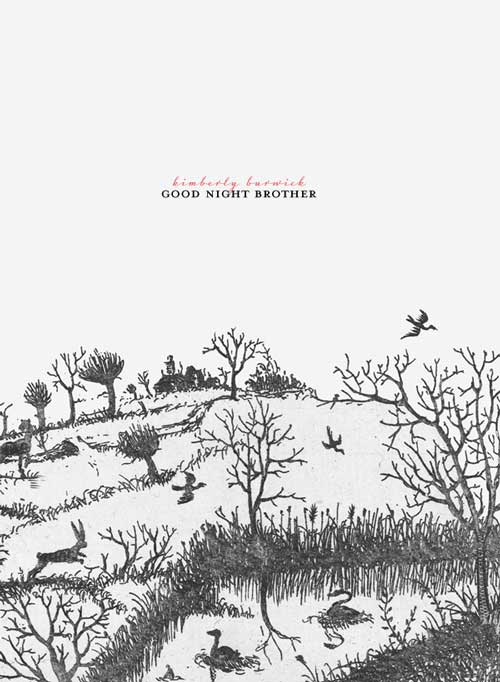
Good Night Brother
Kimberly Burwick
2014
$12 (shipping included)
Kimberly Burwick is the author of Has No Kinsmen (Red Hen Press, 2006) and Horses in the Cathedral, winner of the Robert Dana Prize (Anhinga Press, 2011). She teaches creative writing at Washington State University and at UCLA Extension. Her poems have also won the C.P. Cavafy Prize from Poetry International and the Black Warrior Review Poetry Prize. Originally from New England, she now lives in Moscow, Idaho, with her husband and three-year-old son.
“In Good Night Brother, the tension between saying and not-saying is palpable, intense, and deeply moving; similarly, the gestures of innocent ease and alert vigilance are unnervingly close. Kimberly Burwick deftly inhabits divided realms—the lushness of the giving, natural world and the violence of the human-made one, and as every poet of witness must, she accepts the weighty task of naming exactly what she sees before her. In these spare and yet richly sensuous poems, every human experience touched is indeed ‘blessed with utterance.’”
—Lia Purpura
“What to do with the unthinkable, the grotesque—the bird shot to bits, the girl like flowers ground to raw paste—that which seems broken beyond repair? Kimberly Burwick tells us, ‘Every sentence is really a question of harvests,’ and in her collection Good Night Brother she reaps poems sown from the hard seeds of horror. But they blossom with a vivid life that can’t be denied: ‘[I] laid you down / in the hole / of beauty where lily / mold and leaves / became sweet / with ants.’ And what luck it is that Burwick reveals this sweetness for us, that she reclaims the broken world.”
—Keetje Kuipers
“Good Night Brother opens a world of experience as distilled and compelling as anything Dickinson or Plath might render, in a music wrought from anguish. Poem after poem stops us short, not only for its sheer courage, its willingness to confront the raw truths of a ‘deformed’ relationship, but for its craft, its nuance, its impossible restraint. Burwick perfects a poetry at once compact and referential; her lines are like barbed wire strung between despair and survival. ‘We Are Where We Tremble,’ the first title reads, and it is a definition of ‘home’ in the broadest, as well as most intimate, sense; self, family, the natural world, even the holy all appear as dark echoes of themselves. As if performing serial exorcism, the poems range from plea to curse to indelible prophesy: ‘And there will be two / kinds of night inside the blue cells of water’ (‘They Say the Brother Will’). They are as unforgettable as they are disturbing. They should be read not as confession, but as art.”
—Stan Sanvel Rubin